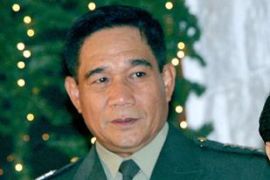Philippine killings blamed on army
Inquiry says military murdered hundreds of activists, community workers and farmers.

‘No stone unturned’
General Hermogenes Esperon, head of the Philippines army, said: “We acknowledge that some members of the armed forces of the Philippines have been involved in the deaths of some members of militant organisations, but we definitely do not condone these.
“In fact, more than condemning these acts, we have taken action to investigate them in order to prosecute those who are responsible.
“We will leave no stone unturned in our investigation and we will spare no one, regardless of rank or position. The armed forces of the Philippines assures the public that it does not tolerate nor condone human rights violations.”
Disgruntled officers have been involved in more than a dozen coup plots since Ferdinand Marcos, the military-backed leader, was ousted in 1986.
Gloria Macapagal Arroyo, the Philippines president, came to power in 2001 when the military chief withdrew support for her predecessor Joseph Estrada, now on trial for plunder.
Arroyo appointed Melo to lead an inquiry into the murders last year after human rights groups, including Amnesty International, said the series of killings of political activists could be linked to some members of the security forces.
Melo said he would present his report to Arroyo later on Tuesday.
Whitewash
The former judge recommended that commanding officers face military tribunals for extrajudicial killings in their areas.
Melo said: “They should have known what was happening and they just kept silent.”
Some groups have called the report a whitewash.
Renato Reyes, general secretary of Bayan, an alliance of worker and peasant organisations, said: “It has been established by documentary evidence that there is a national policy sanctioning the killing of activists.
“We have seen cabinet-level documents that show how these killings were sanctioned at the highest levels of office. The Melo commission had it wrong when it says the killings were perpetrated by soldiers who are merely unchecked by their superiors.”
The military and government have previously blamed communist fighters for the recent surge in killings, saying the communist New People’s Army was purging its ranks as it did in the 1980s.
The shootings, often carried out in daylight by masked gunmen on motorbikes, have continued this year.